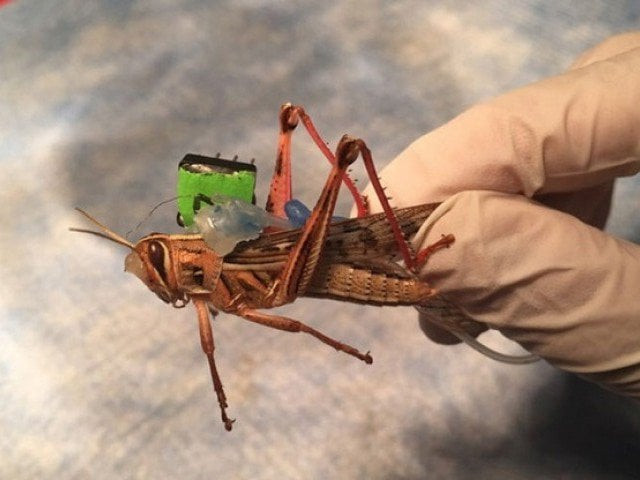Spray plane arrives to bolster fight against locust
Iran offers joint cooperation as Sindh mulls for agricultural emergency agency to rid province of insect

PHOTO: EXPRESS/FILE
Ankara on Wednesday handed over a purpose-built Piper Brave spray aircraft along with four crew members to Pakistan Air Force (PAF). The aircraft would be assembled before its departure for the pest infected areas in the country, especially in southern Sindh and northeastern Punjab, the PAF said.
“Turkey and Pakistan are all weather friends and this gesture would help improve a comprehensive pest control system to overcome the locust plague,” the PAF said in a statement. The aircraft was airlifted to Pakistan from Turkey’s southern province of Adana, it added.
According to a spokesperson for the National Disaster Management Authority (NDMA), the aircraft has been leased for six months for aerial spray in locust-affected areas. “The use of the aircraft will be effective in eradicating locusts from the country,” he said.
Locusts threaten to destroy crops in Khairpur
The locust invasion has put Pakistan in state of emergency. Swarms of locusts are wreaking havoc in the agricultural heart of Pakistan, destroying crops in Punjab and Sindh. This is the second locust attack in Pakistan in less than three months.
The desert locusts — large herbivores that resemble grasshoppers — arrived in Pakistan from Iran and spread to as far as the Pakistan-India border around the Cholistan desert in Punjab after ravading crops in Sindh and Balochistan.
Iran has said that the southern part of the country was hit by locus attacks this winter after the insect migrated from the border areas of Pakistan and India. Iranian officials, however, warned that when the winds in Iran turned towards land, the locusts would return to Pakistan.
To cope with the situation, according to sources, Iranian Ambassador to Pakistan Syed Mohammad Ali Hussaini has offered joint cooperation to Pakistan. The ambassador has stressed the need for the two countries to increase budget and regional cooperation to fight this common threat.
The ambassador has said that for the past few years, both Iran and Pakistan had been facing the problem of desert locust attacks but this year, the estimates suggested that the insect onslaught could the most severe in the last 50 years, the source said.
The Iranian ambassador has pointed out that eliminating locust in Pakistan and India would not be possible without controlling it in Iran. He has proposed anti-locus spray on crops before the attack and fighting the insect before laying eggs.
The insect returns
For this purpose, he has suggested a virtual meeting between the two countries. The ambassador has called for the plant protection departments of the two countries to adopt a joint strategy to fight this deadly onslaught.
‘Centre unwilling to help with locusts’
The Iranian offer came days after Sindh’s Agriculture Minister Ismail Rahu warned of a second locust attack in the province, saying that swarms of the insect had entered Sindh and Balochistan from the neighbouring countries of India and Iran.
“Large locust swarms are coming to Sindh from Balochistan. There have been locust attacks in 15 districts of Sindh. Had there been any aerial sprays in Balochistan, locust would not have come to Sindh,” Rahu said on Wednesday.
“Currently, 15 districts of Sindh are severely affected by locust. The cotton and rice crops may be severely affected. If timely steps are not taken by the federal government the agricultural economy will be ruined,” the minister told the office-bearers of the Sindh Chamber of Agriculture (SCA).
“The locust has even reached Karachi yesterday,” he said. While, expressing his frustration that the federal government was not ready to help, he added that the Sindh government was considering to set up an agricultural emergency agency at the provincial level to fight locust.
According to the minister, the Sindh government planned to buy more four-wheelers and spray equipment for use in the desert areas. The agriculture experts expressed concern over the federal government’s failure to help eradicate locusts in Sindh and demanded immediate aerial spray.
According to the NDMA. Ghotki, Sukkur, Khairpur, Sanghar, Umerkot and Tharparkar districts of Sindh had suffered the most damage because of the locust attack. Swarms had also descended upon Nawabshah, Mirpurkhas, Badin, Thatta, Sujawal and Karachi, it added.
With inputs from agencies



















COMMENTS
Comments are moderated and generally will be posted if they are on-topic and not abusive.
For more information, please see our Comments FAQ